New SARAS Chair on Sociocultural Anticipation and Resilience was presented at Executive Tower
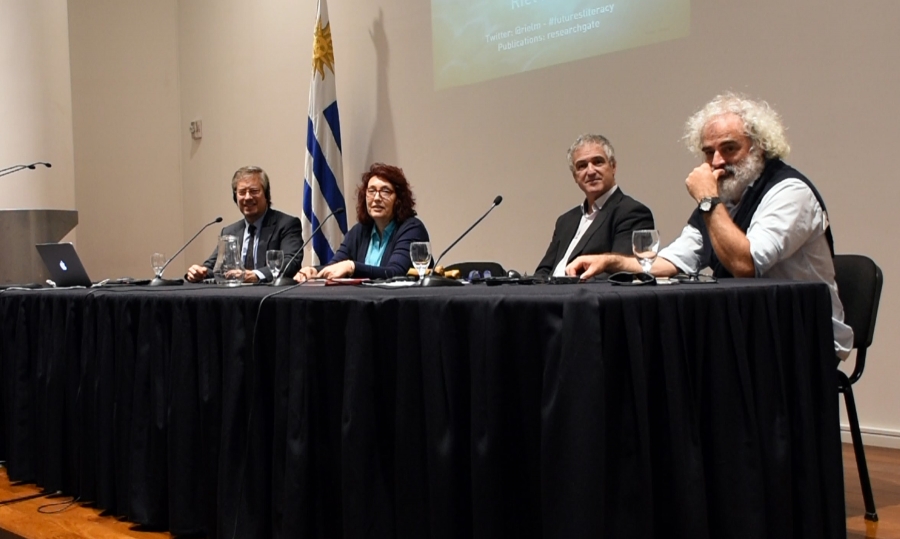
The UNESCO Chair on Sociocultural Anticipation and Resilience based at SARAS Institute was presented last October 26th, 2018 through two events held at the Executive Tower in Montevideo, Uruguay..
In the morning, a meeting was held with different governmental institutions in which Lydia Garrido (SARAS Institute Associate and responsible for the Chair on Sociocultural Anticipation and Resilience) and Riel Miller (leader of UNESCO’s Global Project on Futures Literacy and the Discipline of Anticipation) presented the main conceptual frameworks behind this subject. In addition, a set of different priorities were revealed as well as opportunities for the development of the topic in the country were identified – especially stressing inter-institutional cooperation. The meeting was joined by representatives from the following institutions: Sectoral Commission for Scientific Research (CSIC – Udelar), National Research and Innovation Agency (ANII), Uruguay’s National Commission for UNESCO (COMINAL), Development Bank of Latin America (CAF), Ministry of Industry, Energy and Mining (MIEM), Agency of Electronic Government and Information and Knowledge Society (AGESIC), Uruguayan Agency of International Cooperation (AUCI), National Secretariat of Environment, Water and Climate Change (SNAACC), National Emergencies System (SINAE) and the Ministry of Education and Culture of Uruguay (MEC)..
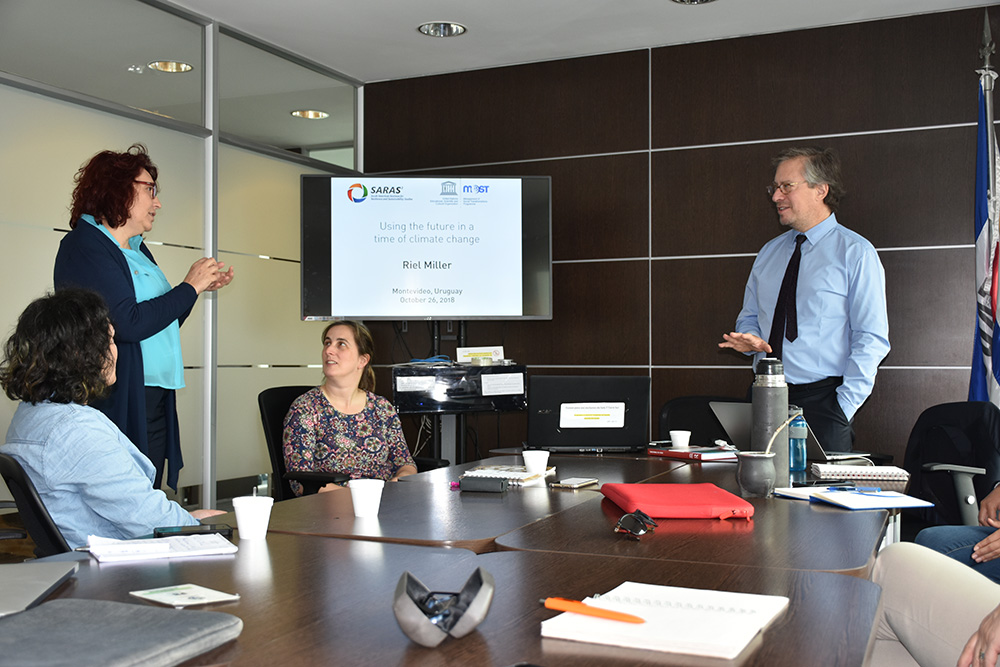

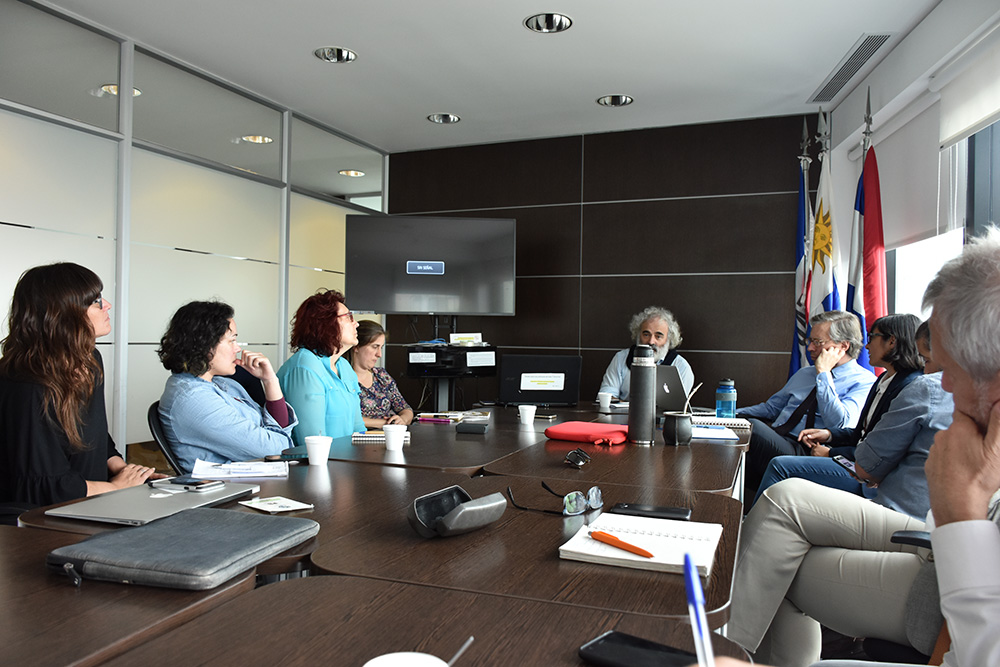
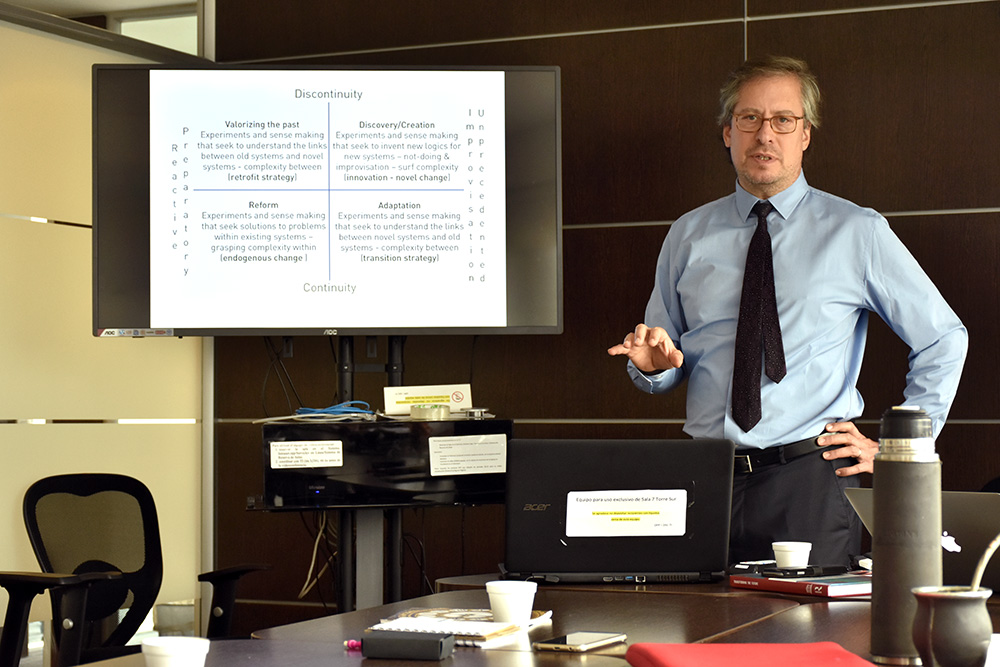
The public event, carried out in the afternoon, consisted of a conference and book presentation: “Transforming the Future. Anticipation in the 21st Century”. It included the presentations delivered by Lydia Garrido, Riel Miller, Ramón Méndez (Head of Planning at Montevideo City Council and former director of Climate Change at the Ministry of Housing, Territorial Planning and Environment – MVOTMA) and Néstor Mazzeo (SARAS Executive Director) who reflected, together with the public, on the implications and needs for adopting a Futures Literacy approach following UNESCO’s lines of work and its local relevance..
At the beginning of the activity, Garrido presented the Chair’s goals, the networks and partners with whom work is going to be developed, as well as a list of activities proposed to take place in the near and mid-term future. Among them, she highlighted the intention of developing action-research projects, fostering networked work -a global colaboratory, and a Futures Literacy program of permanent learning. This program will seek to improve the capabilities and competences for anticipation and the use of the future as key tools for decision-making and to strengthen the capacity for freedom and free choice in general.
As for Riel Miller, during his official visit to Uruguay as the Head of Futures Literacy at UNESCO, he delivered a keynote conference in which he introduced the key ideas that support this approach through examples and analogies aimed at increasing the understanding of the topic by the general public. In one of them, he referred to the widespread phrase -especially among teams and strategies trying to promote change and innovation- “to think outside the box”. Miller argued that without the capacity to anticipate the future and understand the assumptions that shape how the future can be seen from the present, it is impossible to identify or be able to tell the difference between what is the box and where the “out of the box” would be.
During his presentation, he laid out the theoretical grounds that are key to the discipline of anticipation and understanding how to use of the future. At the same time, he introduced the attendees to the recently launched book which has been coedited by UNESCO/Routledge and is entitled “Transforming the Future: Anticipation in 21st Century” (free access and currently only available in English). Miller highlighted the regional scope of this Chair on Sociocultural Anticipation and Resilience, because of being the first one on the topic in Latin America.
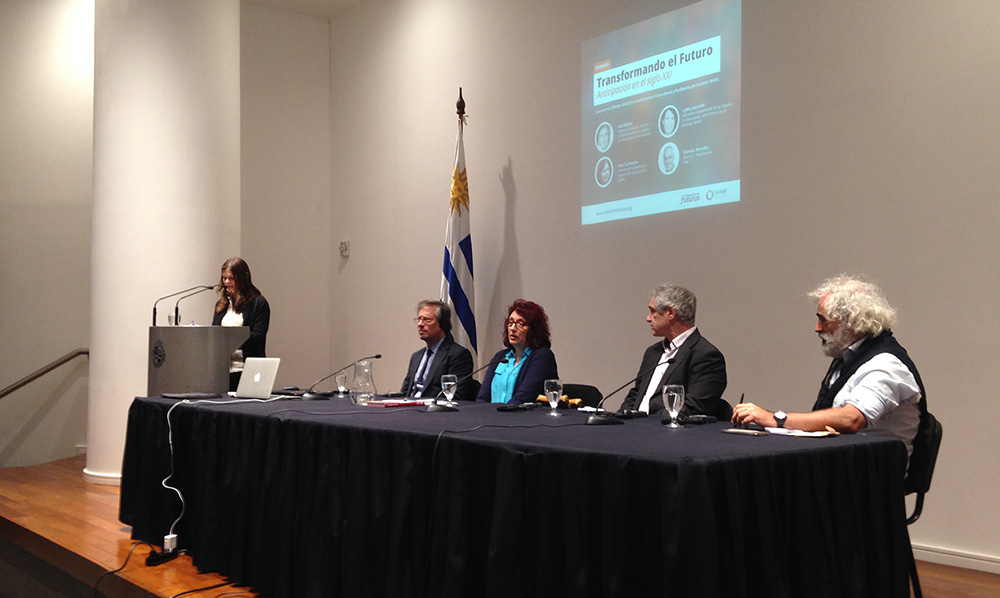
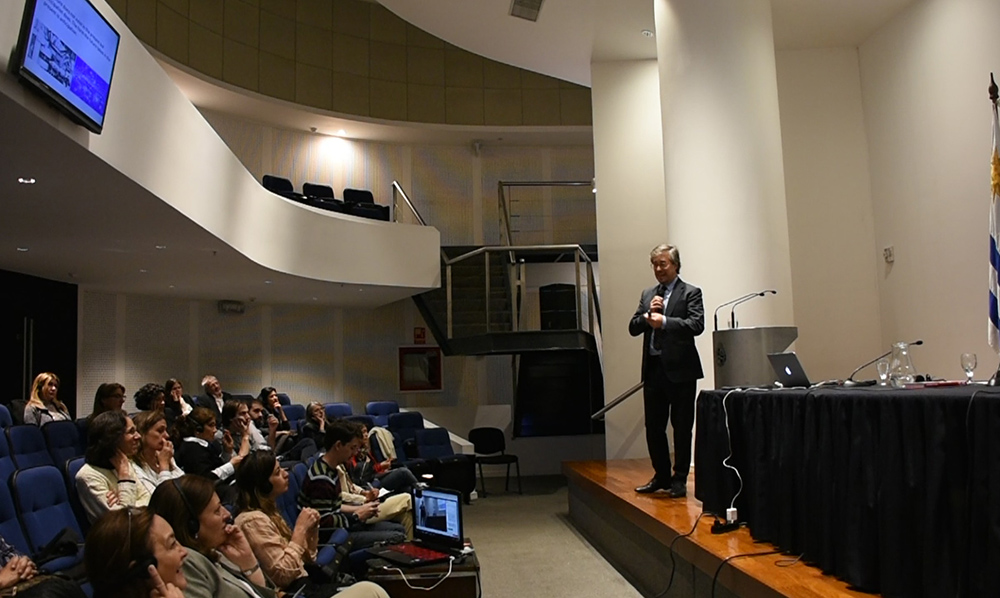

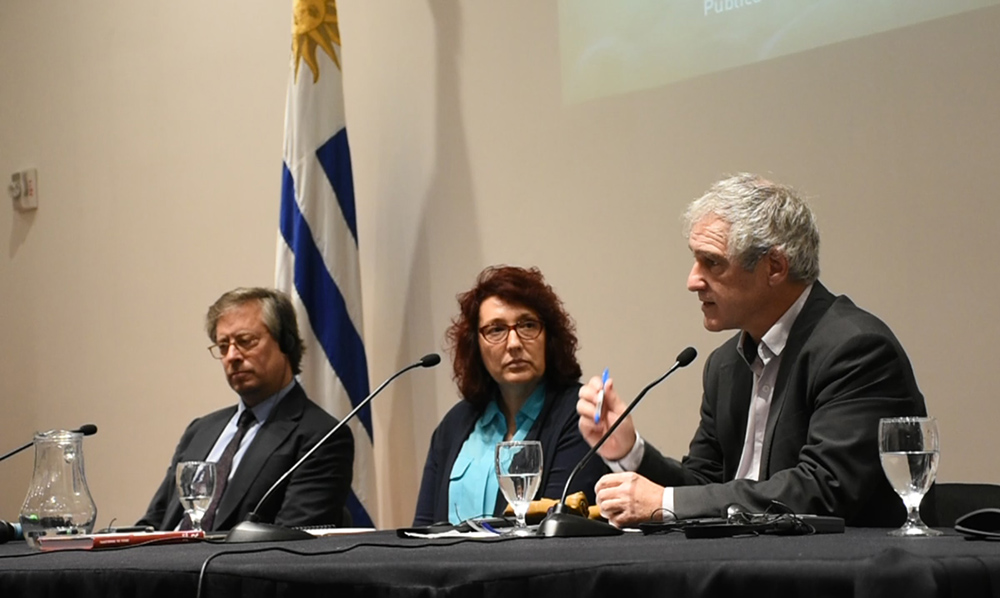
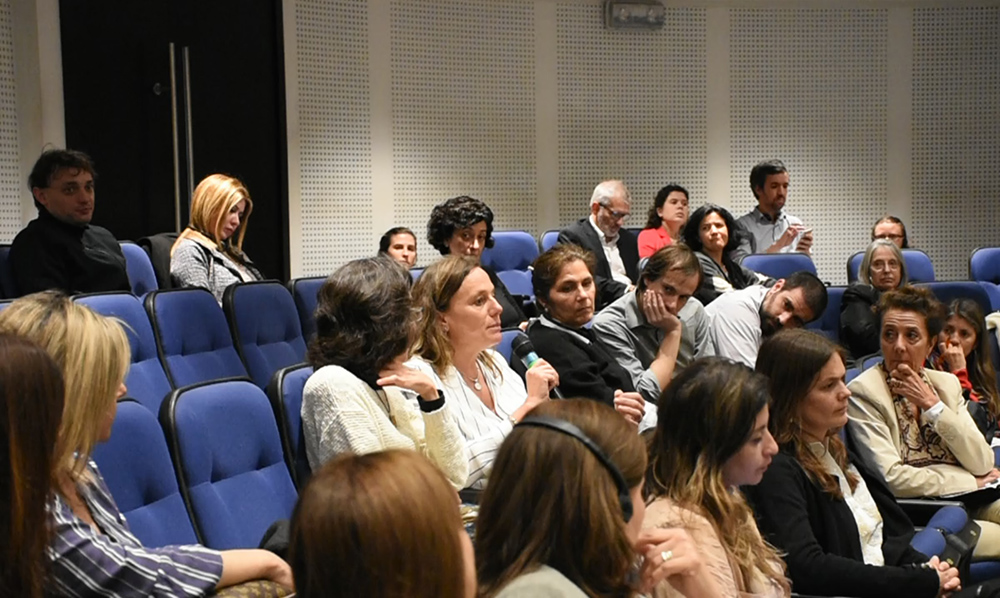
Consequently, Ramón Méndez stressed the importance of future anticipation, especially in relation to decision-making, speaking from his experience in public policies on topics related to energy, environment and city planning. He stressed the existence of power conflicts and pointed out to the relevance of the participation of diverse actors that may be able to “step in the future and look at the present”, so as to project the collective creation of futures that can be thought of from “outside the box”. Finally, he mentioned that different exercises have started to be carried out at Montevideo’s City Council, such as “Montevideo of Tomorrow”, a program that is mainly focused towards the inclusion of the city to the Global Network of Resilient Cities.
Néstor Mazzeo, on the other hand, highlighted the importance of the approach of using the future especially in relation to resilient thinking and the relevance that it has in the work that is carried out at SARAS Institute. Mazzeo argued that when understanding resilience as “the right management of memory and oblivion”, anticipation is necessary when dealing with resilient states that can be either favourable or disadvantageous, stressing the importance of the capacity for transformation especially in situations of novelty where no historical references on which to base upon are available. He stressed that it is important to consider and make visible those “anticipatory assumptions” that determine the perspectives guiding the analysis and the use of different research tools that inform the discussions on the sustainability issues that affect us all..
The event ended with ample time for questions and comments from the attendees which highly enriched the dialogue and allowed to deepen on different aspects that arose from the public’s interest.
Click here to learn more about UNESCO’s Chair on Sociocultural Anticipation and Resilience from SARAS Institute.
To access the book “Transforming the Future. Anticipation in the 21st Century”, click here.
Más información sobre Riel Miller
Riel Miller is the leader of the Futures Literacy Project, at UNESCO Paris, which is oriented towards the strengthening and creation of anticipation capacities and competencies. With over 30 years of experience in the theory and practice of using the future to improve management and decision-making, he constitutes one of the pioneers in the field of Futures Literacy and the Discipline of Anticipation with a cutting-edge theoretical, methodological and practical approach within the field of Future Studies. Miller holds an MA from the Department of Social and Political Thought (York University, Toronto) and a PhD from the Department of Economics, New School for Social Research – New York. Between 1982 and 2004, he worked as an advisor and rapporteur for the Organisation for Economic Co-operation and Development (OECD) in matters related to education policy, economics and research as well as the International Futures Program (OECD, International Foresight Program). He is a professor, researcher and international consultant who has been extensively published in academic journals and other media on a wide variety of topics, especially related to the future of education and internet, productivity and leadership transformation, innovation and creativity, complexity and uncertainty. He is the editor and co-author of UNESCO-Routledge’s recently published book: “Transforming the Future: Anticipation in 21st Century”..
More information on Lydia Garrido
Lydia Garrido is a Social Anthropologist specialized in social change, integral sustainable development and resilience. As a practitioner of anthropology of anticipation she pays special attention to emergent processes in contemporary societies and how communities perceive and use the future, with the objective of generating knowledge to strengthen decision-making capacities. During the last six years, she has been working in the field of anticipation and futures studies, contributing directly and extensively to UNESCO efforts to develop the theory and practice of Futures Literacy and Anticipatory Systems. The action-research she has been conducting with UNESCO has focused on the role of anticipation on sociocultural change, resilience and collective intelligence knowledge creation and processes. She has extensive experience with UNESCO’s Futures Literacy Laboratories in several countries in Latin America, Europe and East Asia. Currently, she is director of the Futures Laboratory Network at SARAS, which conducts research and education activities on Anticipation and Futures Literacy.
